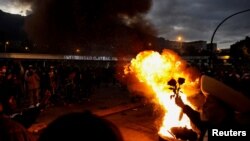Ecuador’s government and leaders of indigenous groups reached an agreement on Thursday to end a protest against economic measures by President Guillermo Lasso, which for more than two weeks blocked roads and hit the country’s ailing economy.
The protests began on June 13, led by the indigenous organization CONAIE, demanding a lower price of gasoline and diesel, the limitation of extractivist expansion and longer terms to cover debts with banks, among other requests.
The government and indigenous leaders resumed dialogue with the mediation of the Catholic Church after being suspended this week by Lasso.
The demonstrations caused food and medicine shortages, and severely affected the oil industry, Ecuador’s main source of income, which stopped producing the equivalent of 213 million dollars, according to figures from the Ministry of Energy.
“We have achieved the supreme value to which we all aspire: peace in our country,” Lasso wrote on his Twitter account. “Now together we begin the task of transforming this peace into progress, well-being, and opportunities for all.”
As part of the agreement, the government agreed to reduce the costs of extra gasoline, the most used in the country, and diesel, by an additional 5 cents, after an earlier cut of 10 cents per gallon.
The total price cut of 15 cents on the dollar in both fuels will cost about 340 million dollars a year, the Ministry of Economy and Finance said.
In addition, he offered to repeal a decree with which he sets policies for the oil sector and reform another for mining development, which will guarantee prior, free and informed consultation with the communities before approving the projects.
“We are going to keep up the fight, but at this time, according to the minutes we have signed, we are going to suspend this de facto measure at the national level,” said CONAIE leader Leonidas Iza, amid disagreements among some leaders.
This week, the Ecuadorian president also survived a vote in the National Assembly that sought to remove him, but the attempt led by opposition parties did not have the necessary support in the legislature.
Protesters complained of police violence during the demonstrations and the government reported dozens of members of the security forces injured, while a soldier was killed during an attack on a convoy transporting fuel to Ecuador’s largest oil field. In addition, seven civilians died in the context of the protests.
Energy Minister Xavier Vera said Thursday that the country hopes to start reclaiming oil wells shut down during the protests, with most returning to production within a month.
Ecuador’s pre-crisis oil production of some 500,000 barrels per day (bpd) had fallen to 234,310 bpd on Wednesday after more than 1,200 wells were shut down.
Connect with the Voice of America! Subscribe to our channel Youtube and turn on notifications, or follow us on social media: Facebook, Twitter and Instagram.







![[Img #74664]](https://thelatestnews.world/wp-content/uploads/2024/12/James-Watson-The-controversial-genius-behind-the-double-helix-150x150.jpg)









Add Comment